Grows a very large bulb containing easy to peel cloves. The white wrappers have delicate purple stripes. This one is #1 on taste. Stores up to six months. Does well in any climate.
- From $399 USDUnit price /Unavailable
Description
Let us tell you about Lettuce Leaf Basil. It’s a lovely Italian basil that grows huge leaves as big as your hand, with a flavor that’s sweeter and less spicy than other basils. Its crinkles hold onto dressing in salads, you need only one leaf for a sandwich or wrap, and you can use the rest as you would any other basil. Save the edible flower spikes to garnish seafood dishes and cocktails.Harvest the leaves and stems from the top part of the plant, and pinch off edible flower buds as they appear, which prevents the leaves from turning bitter, and signals the plant to branch out and grow more leaves, making a bushier plant. The more you harvest, the more it grows!
- Sweet and mild
- Huge 5"-6" leaves
- Grows 1'-2' tall
- Good for containers
- Tons of medicinal benefits!
As a medicinal herb, Basil has been used internally to treat anxiety, colds, colic, cough, depression, diarrhea, fever, flatulence, flu, indigestion, insomnia, intestinal parasites and worms, exhaustion, gastric pain, gonorrhea, lactation problems, migraine headache, nausea, stomach cramps, sore throat, and vomiting, and externally to treat acne, insect bites and stings, loss of smell, skin problems, snake bites.
⚠️ Do not use medicinally while pregnant.
⚠️ Medicinal properties are presented as information only, and are not a recommendation or prescription for use. Consult a medical professional before using any herb medicinally.
As a companion plant, Basil attracts hummingbirds, pollinators, and beneficial insects, and repels asparagus beetles, cabbage moths, cabbage white butterfly, cabbage worms, carrot rust fly, flies, maggots, mice, mosquitoes, spider mites, thrips, and tomato hornworms.
Shop all Basil Seeds Shop Good Companion Plants for Basil 📚 Grow Guide: Basil
Health Benefits of Genovese Basil
Basil is a known health tonic for expecting mothers and when mixed with tea it increases lactation in mothers. It is also a nerve tonic and young children are sometimes encouraged to chew on the leaves of basil because it stimulates brain cells and can increase memory.

See Basil Recipes & Growing Tips on our Pinterest Board
Shop all Basil Seeds Shop Good Companion Plants for Basil 📚 Grow Guide: Basil Tomato - Oxheart, Pink (Indeterminate)
From $399 USDUnit price /UnavailableDescription

Valentine’s Day is too early to grow the Pink Oxheart Tomato, but you’ll have all summer to court your sweetheart with these dark pink heart-shaped fruits. Juicy and meaty, this luscious slicer grows to 1-2 lbs. Its mild, sweet flavor is just right for a romantic picnic of tomato sandwiches, pizza and a movie, or marinated tomato tortellini by candlelight.
You may also like: Orange Oxheart Tomatoes ⟐ Yellow Oxheart Tomatoes- High yields
- Low acidity
- Small seed core
- Mild, sweet flavor
SEED PLANTING TIPS
- Botanical name: Solanum lycopersicum
- Growth type: Indeterminate, trellis support, regular pruning
- Tomato size: Large (1-2 lbs.)
- Depth to plant seeds: .25" deep
- Spacing between plants: 24" apart
- Spacing between rows: 36"-48" apart
- Days to germinate (sprout): 7-14 days
- Germination soil temps: 75F-95F
- Soil needs: 6.0-6.5 pH
- Sun needs: Full sun
- Frost hardy: No
- Planting season: Spring, summer
- # of plants per sq. ft.: Appx. 1 plant per 2 sq. ft.
- Days to maturity: 80-90 days
Click here to view our full Tomato grow guide
Good companion plants: Basil, Borage, Onion, Parsley, Pepper
Tomato - Bradley (Indeterminate)
From $399 USDUnit price /UnavailableDescription
The Bradley Tomato is a sweet little pink tomato. By sweet, we mean lightly sweet and slightly acidic. By little, well, that’s just what you say when you describe something darling; it’s a medium-sized fruit. As for pink, it’s a dark pink. To be precise, it’s a lightly sweet and slightly acidic medium-sized dark pink tomato. A reliable producer with good-old fashioned tomato flavor.
- Well-balanced flavor
- Dark pink color
- Reliable producer
- Good fresh or cooked
SEED PLANTING TIPS
- Botanical name: Solanum lycopersicum
- Growth type: Indeterminate, trellis support, regular pruning
- Tomato size: Medium
- Depth to plant seeds: .25" deep
- Spacing between plants: 24" apart
- Spacing between rows: 36"-48" apart
- Days to germinate (sprout): 7-14 days
- Germination soil temps: 75F-95F
- Soil needs: 6.0-6.5 pH
- Sun needs: Full sun
- Frost hardy: No
- Planting season: Spring, summer
- # of plants per sq. ft.: Appx. 1 plant per 2 sq. ft.
- Days to maturity: 75-80 days
Good companion plants: Basil, Borage, Onion, Parsley, Pepper
- From $299 USDUnit price /Unavailable
Description

Quick Overview
Bronze yellow skin, mild, and sweet. Plant them close together if you want fast growing scallions.They are technically long day onions. However, they can be grown anywhere, down south they will be more grown like big scallions.
How to Plant Bulb Onions
Onion bulbs are quite hardy and can withstand 20° F frost. They should be set out 4-6 weeks prior to the last expected frost. When your plants arrive they should appear to be quite dry. DO NOT WET THEM NOR STICK THEIR ROOTS IN WATER. Unpack them and store them in a cool, dry place until it is time to plant. They should last about 3 weeks kept this way. Do not worry that your plants seem dry. They will "shoot" new roots and new, green tops as soon as they are planted. - From $199 USDUnit price /Unavailable
Description
- Taraxacum officinalis. Perennial.
- This strain forms lush heads of leaves that will rival your favorite lettuce. The leaves are tender, fleshy and dark green.
- The plants spread up to 2 ft and the vitamin rich leaves can be eaten raw, boiled, stir fried and used in soup.
- The roots can be eaten raw, cooked or roasted and made into a coffee substitute.
- The flowers can be used to make fritters, tea and dandelion wine.
- From $399 USDUnit price /Unavailable
Description

- Crisp & refreshing lettuce variety
- The leaves of this particular lettuce makes it idea for use in gourmet sandwiches, burgers and salads
-
Days to Maturity | 60 days
-
Lettuce Seeds | Lettuce can be grown practically anywhere. For leaf types seed should be sown thinly in rows 1 foot apart. For head, Bibb, and cos types, space rows 18 inches apart.
Click here for complete Lettuce grow guide
- Crisp & refreshing lettuce variety
- From $099 USDUnit price /Unavailable
Description

The Romano Pole Bean is a traditional Italian heirloom bean enjoyed by generations of gardeners. The vining plant produces high yields of flat, wide, stringless 6" pods that taste best when harvested young. Just a great all-around green bean.
- Easy to grow
- Stringless variety
- Harvest young for best flavor
- Vining plant requires staking
SEED PLANTING TIPS
- Botanical name: Phaseolus vulgaris
- Depth to plant seeds: 1" deep
- Spacing between plants: 5" apart
- Spacing between rows: 18"-24" apart
- Days to germinate (sprout): 8-14 days
- Germination soil temps: 70F-85F
- Soil needs: 6.0-7.0 pH
- Sun needs: Full sun
- Frost hardy: No
- Planting season: Spring, summer, fall
- # of plants per sq. ft.: Appx. 4 plants per sq. ft.
- Days to maturity: 65-80 days
Click here to view our full Bean grow guide
Good companion plants: Cucumber, Pea, Rosemary, Thyme, Tomato
- From $399 USDUnit price /Unavailable
Description
Licorice Basil is a type of Thai basil with a pleasant, sweet licorice flavor. Beautiful as a fragrant and ornamental accent throughout the garden, and delicious in salads, baked goods, and pasta sauce. It’s also pleasant to look at with deep green leaves that sometimes show a burgundy tinge, plum-colored stems, and lavender flower spikes that make a fun garnish for any salad, dish, or drink.Harvest the leaves and stems from the top part of the plant, and pinch off edible flower buds as they appear, which prevents the leaves from turning bitter, and signals the plant to branch out and grow more leaves, making a bushier plant.
The more you harvest, the more it grows!
- Sweet, pleasant licorice flavor
- Thai basil type
- Edible ornamental
- Good for containers
- Tons of medicinal benefits!
As a medicinal herb, Basil has been used internally to treat anxiety, colds, colic, cough, depression, diarrhea, fever, flatulence, flu, indigestion, insomnia, intestinal parasites and worms, exhaustion, gastric pain, gonorrhea, lactation problems, migraine headache, nausea, stomach cramps, sore throat, and vomiting, and externally to treat acne, insect bites and stings, loss of smell, skin problems, snake bites.
⚠️ Do not use medicinally while pregnant.
⚠️ Medicinal properties are presented as information only, and are not a recommendation or prescription for use. Consult a medical professional before using any herb medicinally.
As a companion plant, it attracts hummingbirds, pollinators, and beneficial insects, and repels asparagus beetles, cabbage moths, cabbage white butterfly, cabbage worms, carrot rust fly, flies, maggots, mice, mosquitoes, spider mites, thrips, and tomato hornworms.
Shop all Basil Seeds Shop Good Companion Plants for Basil 📚 Grow Guide: Basil 
This basil variety produces lovely and flavorful green leaves with purple accents. It has a strong, but enjoyable licorice flavor and can grow up to 24" tall.

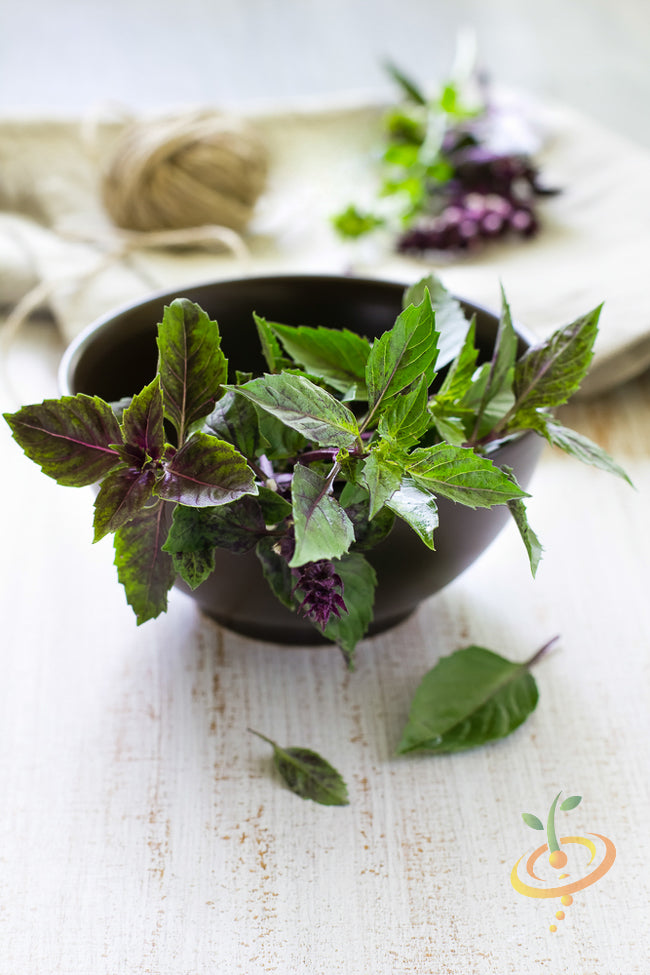
What is Licorice Basil?
This basil is a type of Thai Basil, also known as anise basil. It has strong licorice and anise flavors, qualities and aromatics. It's known to be slightly "lanky" with pointed green leaves with signature purple flowers. Both the leaves and flowers are edible on this plant.
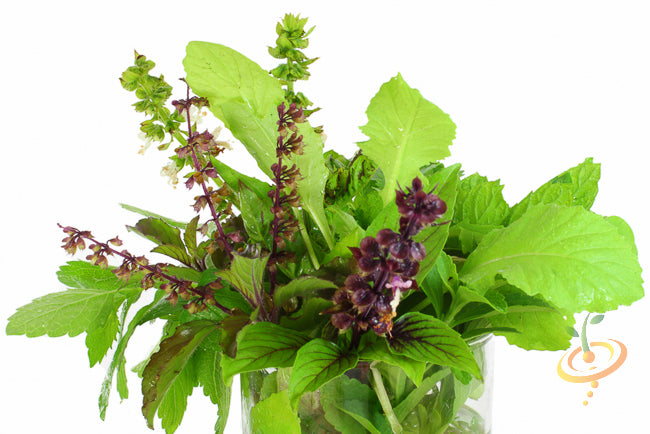
Health Benefits of Licorice Basil
Licorice Basil can be used for treating the common cold, the flu, diabetes, asthma, bronchitis, earaches, headaches, upset stomachs, heart disease, fever, and more. It promotes longevity but something you may not know is that its an excellent mosquito repellent!

Ways to Consume Licorice BasilWhen Licorice Basil leaves are crushed, they burst with intense basil and licorice aromas. Fragrant and floral, the spicy paste is a condiment for multiple dishes. This basil is best when mixed with other ingredients to tame it's powerful one-dimensional notes.

See Basil Recipes & Growing Tips on our Pinterest Board
Shop all Basil Seeds Shop Good Companion Plants for Basil 📚 Grow Guide: Basil - From $399 USDUnit price /Unavailable
Description
Greek Basil is a small-leaf dwarf variety that grows into a tight dome, about 1’ tall and wide. A great one for containers, hanging baskets, and indoor gardens. The bright green, oval leaves and soft stems have hints of clove and anise, and keep their flavor when dried. Use this variety to flavor herb butters and vinaigrettes, and the edible flowers as a garnish or salad green.Harvest the leaves and stems from the top part of the plant, and pinch off edible flower buds as they appear, which prevents the leaves from turning bitter, and signals the plant to branch out and grow more leaves, making a bushier plant.
The more you harvest, the more it grows!
- Basil-clove-anise flavor
- Compact plant
- Good for indoor gardens
- Good for containers
- Tons of medicinal benefits!
As a medicinal herb, Basil has been used internally to treat anxiety, colds, colic, cough, depression, diarrhea, fever, flatulence, flu, indigestion, insomnia, intestinal parasites and worms, exhaustion, gastric pain, gonorrhea, lactation problems, migraine headache, nausea, stomach cramps, sore throat, and vomiting, and externally to treat acne, insect bites and stings, loss of smell, skin problems, snake bites.
⚠️ Do not use medicinally while pregnant.
⚠️ Medicinal properties are presented as information only, and are not a recommendation or prescription for use. Consult a medical professional before using any herb medicinally.
As a companion plant, it attracts hummingbirds, pollinators, and beneficial insects, and repels asparagus beetles, cabbage moths, cabbage white butterfly, cabbage worms, carrot rust fly, flies, maggots, mice, mosquitoes, spider mites, thrips, and tomato hornworms.
Shop all Basil Seeds Shop Good Companion Plants for Basil 📚 Grow Guide: Basil


See Basil Recipes & Growing Tips on our Pinterest Board
Shop all Basil Seeds Shop Good Companion Plants for Basil 📚 Grow Guide: Basil - From $199 USDUnit price /Unavailable
Description
The Purple Podded Pole Bean produces a profuse plurality of purely purple pods. View this variety vegetate vigorous verdant vines with violet developments. Stringless shells surround savory seeds.
- Easy to grow
- High yielding
- Long pods up to 7"
- Easy to harvest
SEED PLANTING TIPS
- Botanical name: Phaseolus vulgaris
- Depth to plant seeds: 1" deep
- Spacing between plants: 5" apart
- Spacing between rows: 18"-24" apart
- Days to germinate (sprout): 8-14 days
- Germination soil temps: 70F-85F
- Soil needs: 6.0-7.0 pH
- Sun needs: Full sun
- Frost hardy: No
- Planting season: Spring, summer
- # of plants per sq. ft.: Appx. 4 plants per sq. ft.
- Days to maturity: 70-75 days
Click here to view our full Bean grow guide
Good companion plants: Cucumber, Pea, Rosemary, Thyme, Tomato
Swiss Chard - Barese "Baby Leaf" Dark Green
From $399 USDUnit price /UnavailableDescription
- The Barese Swiss Chard variety produces delicious tender 10" tall dark glossy green leaves with curled edges
- A delicious baby leaf that grows quickly
- Ready to harvest in less than 30 days. Plant produces good yields of 10" tall leaves
- Excellent for salads and/or steamed with others greens
- Days to Maturity | Less than 30 days!
Additional DetailsSwiss chard is high in vitamins A, K and C, with a 175g serving containing 214%, 716%, and 53%, respectively, of the recommended daily value. It is also rich in minerals, dietary fiber and protein.
- The Barese Swiss Chard variety produces delicious tender 10" tall dark glossy green leaves with curled edges
- From $399 USDUnit price /Unavailable
Description
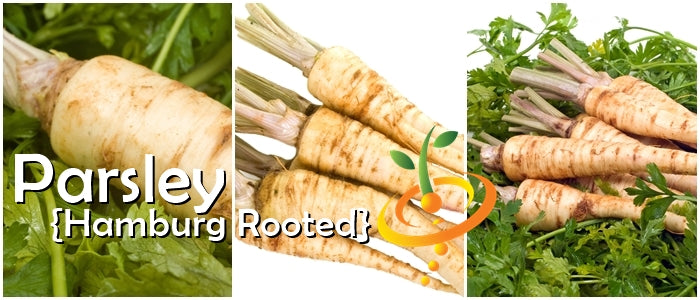
-
A very old heirloom variety dating back to the 1600's
- Hamburg Rooted Parsley is used differently than other parsley plants. It's actually preferred by many European cooks and is typically the main ingredient for many stews
- Hamburg Rooted Parsley is a large edible root with smooth mild parsley flavor
- Very easy to grow
- In Europe root parsley is usually the first choice over parsnips
-
Day to Maturity | 85 days
-
A very old heirloom variety dating back to the 1600's
Sprouts/Microgreens - Rainbow Chard
From $199 USDUnit price /UnavailableDescription
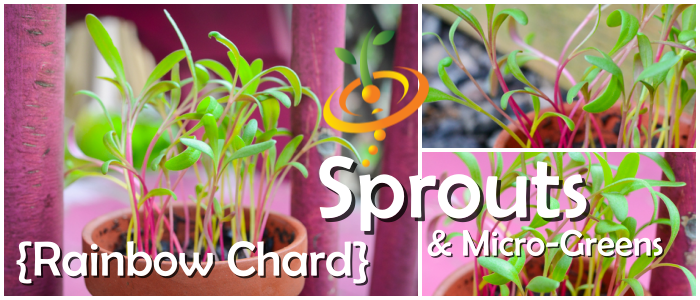
- Delicious
- Nutritious
- Beautiful colored sprouts ranging from red, pink, yellow, and orange
- Easy to grow
- From $399 USDUnit price /Unavailable
Description
View all bean seeds
The Thorogreen Lima Bean is a high-yielding heirloom that loves higher temperatures. Plump, light green pods grow at the top of a compact plant for easy harvesting. Both fresh and dried beans have a smooth, buttery flavor. When eating fresh, be sure to cook them, as raw beans are toxic. This compact bush-type plant spreads wider than green beans, so give them room to grow.
- Easy to grow
- Bush growth habit
- Heat loving
- Early producer
SEED PLANTING TIPS
- Botanical name: Phaseolus lunatus
- Depth to plant seeds: 1.5" deep
- Spacing between plants: 6"-8" apart
- Spacing between rows: 24"-30" apart
- Days to germinate (sprout): 10-21 days
- Germination soil temps: 70F-90F
- Soil needs: 6.0-7.0 pH
- Sun needs: Full sun
- Frost hardy: No
- Planting season: Spring, summer, fall
- # of plants per sq. ft.: Appx. 2-4 plants per sq. ft.
- Days to maturity: 65-75 days
Click here to view our full Bean grow guide
Good companion plants: Cucumber, Pea, Rosemary, Thyme, Tomato
- From $399 USDUnit price /Unavailable
Description

-
The Atlantic Giant pumpkin has been known to grow over 1,500 pounds! Without special treatment, the Atlantic Giant Pumpkin, can grow up to 200 to 300 pounds - easily
- It's best to plant 4 to 5 seeds per hill with hills at least 8 feet apart
-
Days to Maturity | 120 days
-
How to Grow Super Giant MEGA Pumpkins
Additional Details
The word pumpkin originates from the word pepon, which is Greek for “large melon". The French adapted this word to pompon, which the British changed to pumpion and later American colonists changed that to the word we use today, "pumpkin".
-
The Atlantic Giant pumpkin has been known to grow over 1,500 pounds! Without special treatment, the Atlantic Giant Pumpkin, can grow up to 200 to 300 pounds - easily
Cucumber - Armenian, White (Metki Serpent Melon)
From $399 USDUnit price /UnavailableDescription
- These Armenian cucumber seeds will produce delicious white cucumbers as long as 30"!
- Bitter-free with excellent flavor
-
Excellent slicer and ideal for salads and many culinary dishes
- Easy to grow
-
Days to Maturity | 65 days
-
Cucumber Seeds | Grow cucumbers where a long, warm growing season, minimum 65 days, can be assured. Plant seeds where there is ample space and vines can sprawl, the simplest way is to plant cucumbers in hills.
Click here for complete Cucumber grow guide
- These Armenian cucumber seeds will produce delicious white cucumbers as long as 30"!
Cover Crop - Clover (Red Crimson)
From $499 USDUnit price /UnavailableDescription
Quick Overview
• Biennial
• Bees love clover!
Details
Planted spring, summer or fall, this quick growing clover is the most versatile variety for a green manure to enrich soil. Needs good moisture. Flowers are used for tea. Excellent forage and cover crop. Planting rate: ½ lb. per 1,000 sq. ft.Corn Salad (Mache - Lamb's Lettuce) - French
From $399 USDUnit price /UnavailableDescription
- Valerianella locusta (aka Corn Salad) is a small annual plant that is eaten as a leaf vegetable. It has a characteristic nutty flavor, dark green color, and soft texture, and is popularly served as salad greens. //Wikipedia
- Corn Salad has a delicate flavor, similar to a butterhead lettuce. It is quite hardy and requires very little care while remaining practically free of pests & disease. Corn salad is also known for growing vigorously in almost any soil!
- We think Corn Salad tastes best right out of the garden with a light drizzle of olive oil and a squeeze of fresh lemon. Once you try this cold-hardy green, you'll be sure to make it a staple in your fall/winter gardens every year.
-
Day to Maturity | only 40 days
Squash (Summer) - Marrow, Green
From $399 USDUnit price /UnavailableDescription
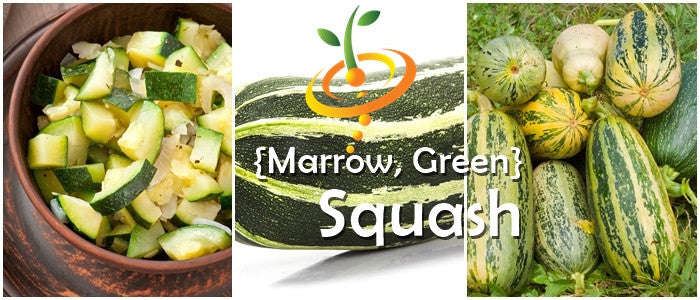
- The Green Marrow Summer Squash produces some of the most beautiful looking dark green squash
- Grows as a compact bush (not as a vine)
- Best when picked at 8" long
- Perfect for small gardens - grows on a compact bush
- Days to Maturity | 85 days
Additional DetailsThough considered a vegetable in cooking, botanically speaking, squash is a fruit (being the receptacle for the plant's seeds). Squash can be served fresh (in salads) and cooked (squash stuffed with meat, fried squash, baked squash).
Nasturtium - Glorious Gleam Flowers
From $399 USDUnit price /UnavailableDescription
Semi-trailing plant with fragrant flowers that come in a variety of shades and colors.
Depth to Plant
Spacing Between Plants
Days to Germinate (Sprout)
Germination
Soil TempBest Season to Plant_________
Sun
RequirementSoil
RequirementsGood Plant Companions
Harvest Instructions
1/2" Deep 12" Apart 7-10 Days Approx. 70 degrees F. Early Spring Full Sun Well drained and sandy Roses and most vegetables Harvest blooms regularly to encourage new growth. 
How to Grow & Harvest Nasturtiums When to Plant
Nasturtiums should be planted in the spring for a "summer show" once soil temperatures have reached around 70 degrees F.
- Nasturtium flowers are one of the most popular edible flowers grown in home gardens. The petals have a slight peppery taste, and the seeds and leaves are also edible! You can even use the seeds as an alternative to capers.
- Not only are the flowers pretty, Nasturtiums are great companion plants! They are also known to deter aphids, whiteflies, cucumber beetles & more. Learn more >
- Nasturtiums should be planted in the spring for a "summer show". Plant in full sun, and in sandy, well drained soil. Generally, the poorer the soil quality, the more flowers the plant will produce! Deadhead your plants regularly to encourage new blooms, all season long. These flowers will self-seed resulting in more flowers for years to come!
- These are PERFECT for beginner gardeners! These annuals are very easy to grow from seed and can be grown just about anywhere, even places that are susceptible to drought.
- The bright flower petals will liven up any garden, with very little effort! They are also GREAT for planting in hanging baskets or containers.


How to Plant
Plant in full sun, and in sandy, well drained soil. Generally, the poorer the soil quality, the more flowers the plant will produce! These seeds require darkness to germinate and will do best with planted a half of an inch deep, spaced at least 12" apart. Plants should appear within 7-10 days. These annuals are very easy to grow from seed and can be grown just about anywhere, even places that are susceptible to drought.When to Harvest
Deadhead your plants regularly to encourage new blooms, all season long. These flowers will self-seed resulting in more flowers for years to come!- From $399 USDUnit price /Unavailable
Description

- Beautiful bright lime green lettuce leaves
- This is the green alternative to Lollo Rossa
- Compact and curly with amazing flavor
- Extremely popular amongst gourmet chefs and restaurants
- Easy to grow and does not require a lot of space
-
Days to Maturity | 50 days
-
Lettuce Seeds | Lettuce can be grown practically anywhere. For leaf types seed should be sown thinly in rows 1 foot apart. For head, Bibb, and cos types, space rows 18 inches apart.
Click here for complete Lettuce grow guide
- Beautiful bright lime green lettuce leaves
Tomato - Marion (Indeterminate)
From $399 USDUnit price /UnavailableDescription
The Marion Tomato is the perfect tomato for Southern gardens—tolerant of heat and humidity, resistant to cracking and disease, producing gobs of scarlet globes that ripen mid-season, and with just enough sweetness and acidity to know you’re eating the perfect tomato. A great-tasting and versatile fruit for sauce and paste or salt and pepper.
- Heat tolerant
- Early producer
- High yields
- Good for Southern gardens
SEED PLANTING TIPS
- Botanical name: Solanum lycopersicum
- Growth type: Indeterminate, trellis support, regular pruning
- Tomato size: Medium
- Depth to plant seeds: .25" deep
- Spacing between plants: 24" apart
- Spacing between rows: 36"-48" apart
- Days to germinate (sprout): 7-14 days
- Germination soil temps: 75F-95F
- Soil needs: 6.0-6.5 pH
- Sun needs: Full sun
- Frost hardy: No
- Planting season: Spring, summer
- # of plants per sq. ft.: Appx. 1 plant per 2 sq. ft.
- Days to maturity: 75-80 days
Click here to view our full Tomato grow guide
Good companion plants: Basil, Borage, Onion, Parsley, Pepper
Squash (Summer) - Lebanese White Bush
From $099 USDUnit price /UnavailableDescription
- The Lebanese Squash is a very popular heirloom squash variety that grows extremely quickly - only 45 days
- Very flavorful and widely grown in the Middle East
-
A summer squash variety from Lebenon
-
Grows as a compact bush size plant (not as a vine)
- Fast-growing summer squash produces large yields
- Perfect for growing in small spaces
-
Days to Maturity | 45 days
The Lebanese, White Squash is a favorite amongst many home gardeners. Most would recommend planting 2-4 bushes to feed a family throughout the season, while for smaller families or couples, 2 plants would be plenty. It really depends on how much squash you love to eat and whether or not you're growing other varieties at the same time. We do however recommend planting at least two plants for better pollination. The better the pollination, the better the fruit count! It's been reported that some gardeners have experienced up to 15 fruits per plant, however, that is on the high side. Most plants will produce 4-6 fruit, again depending on the pollination and other variables that come into play. There's just not an exact answer for this. You're almost at the mercy of mother nature on this, but most would agree it's a great producer! They're better picked when young and tender unless you're planning on stuffing them, then baking. In that case, they are let to grow larger, again, which will keep the plant from producing more fruit if you don't harvest regularly from them. So the bottom line is, if you want more fruit, harvest more regularly and when the squash is young and tender. This will send signals to the plant to bloom and flower again to keep reproducing. Generally, this plant will get 2-3 feet high, but regular fertilizing would, of course, alter these numbers as well. If your soil is in good condition with lots of healthy organic matter, you should have no problem getting plants that reach this size. May we suggest growing on black plastic for weed & insect control?
Additional Details
Though considered a vegetable in cooking, botanically speaking, squash is a fruit (being the receptacle for the plant's seeds). Squash can be served fresh (in salads) and cooked (squash stuffed with meat, fried squash, baked squash).
- The Lebanese Squash is a very popular heirloom squash variety that grows extremely quickly - only 45 days
Nasturtium - Peach Melba Flowers
From $399 USDUnit price /UnavailableDescription
This variety produces cream-like, yellow petals with splashes of darker red in the center. Compact in size with deep blue/green foliage.
- Nasturtium flowers are one of the most popular edible flowers grown in home gardens. The petals have a slight peppery taste, and the seeds and leaves are also edible! You can even use the seeds as an alternative to capers.
- Not only are the flowers pretty, Nasturtiums are great companion plants! They are also known to deter aphids, whiteflies, cucumber beetles & more. Learn more >
- Nasturtiums should be planted in the spring for a "summer show". Plant in full sun, and in sandy, well drained soil. Generally, the poorer the soil quality, the more flowers the plant will produce! Deadhead your plants regularly to encourage new blooms, all season long. These flowers will self-seed resulting in more flowers for years to come!
- These are PERFECT for beginner gardeners! These annuals are very easy to grow from seed and can be grown just about anywhere, even places that are susceptible to drought.
- The bright flower petals will liven up any garden, with very little effort! They are also GREAT for planting in hanging baskets or containers.
Cucumber - Cucamelon, West Indian Burr Gherkin
From $399 USDUnit price /UnavailableDescription

-
Also known as: known as Cackrey, Maroon Cucumber, West Indian Gherkin, and West Indian Gourd.
- Incredibly small, cucumber-shaped fruits.
- The surface of these tiny fruits are covered with spine-like warts, while the flesh is pale green.
- Easy to grow for everyone, sells great at farmers markets!
- Can be cooked or eaten raw. The flavor is similar to that of other more traditional cucumbers.
-
Days to Maturity | 55 - 65 days
Click Here For Our Complete Cucumber Grow Guide
-
Also known as: known as Cackrey, Maroon Cucumber, West Indian Gherkin, and West Indian Gourd.
Wildflowers - Coneflower Scatter Garden Seed Mix
From $499 USDUnit price /UnavailableDescription
 Includes a mixture of 6 popular coneflower varieties. Scatter this mix in your garden and enjoy a beautiful assortment of coneflowers!
Includes a mixture of 6 popular coneflower varieties. Scatter this mix in your garden and enjoy a beautiful assortment of coneflowers!Wildflower establishment requires some important steps:
- Site selection/preparation: It's important to address competition from weeds: pull, till, or use organic herbicides. If planting in the spring/summer you can wait for weeds to germinate, control and then plant the wildflower seeds.
- Seeding: You will want to have good seed to soil contact, broadcasting by hand is a good approach on small plot, may want to mix with an inert carrier, sand or other. Raking in and covering with soil 2-3 times seed thickness.
- Watering: During establishment for the first month, can be from rain in spring or supplement with irrigation.
- Timing: The best time to plant is in spring to early summer and even again in late fall.
This mix includes all of the following seed varieties:GENUS/SPECIES
COMMON NAME

Echinacea purpurea
Purple Coneflower

Echinacea palladia
Pale Purple Coneflower

Rudbeckia amplexicaulis
Clasping Coneflower

Ratibida columnifera
Red Mexican Hat

Ratibida columnifera
Yellow Prairie Coneflower

Ratibida pinnata
Greyheaded Coneflower
Bean, Runner/Pole - Prizewinner
From $199 USDUnit price /UnavailableDescription

The Prizewinner Runner Pole Bean produces a blue-ribbon show of crimson blossoms that transform into succulent, flavorful foot-long pods with speckled purple-red beans inside. Pick young for snap beans and mature for shell beans, or give them more time on stage and use them dried. A prolific producer that will win first, second, and third prize in your garden.- Easy to grow
- High yields
- Long pods up to 12"
- Eat fresh, shelled, or dried
SEED PLANTING TIPS
- Botanical name: Phaseolus coccineus
- Depth to plant seeds: 1" deep
- Spacing between plants: 5" apart
- Spacing between rows: 18"-24" apart
- Days to germinate (sprout): 8-14 days
- Germination soil temps: 70F-85F
- Soil needs: 6.0-7.0 pH
- Sun needs: Full sun
- Frost hardy: No
- Planting season: Spring, summer
- # of plants per sq. ft.: Appx. 4 plants per sq. ft.
- Days to maturity: 80-115 days
Click here to view our full Bean grow guide.
Good companion plants: Cucumber, Pea, Rosemary, Thyme, Tomato
Shop more:
BUSH BEANS
FAVA & BROAD BEANS
LIMA BEANS
POLE BEANS
Squash (Winter) - Hubbard, Golden
From $299 USDUnit price /UnavailableDescription
 Squash (Winter), Hubbard Golden (100% Heirloom/Non-Hybrid/Non-GMO)
Squash (Winter), Hubbard Golden (100% Heirloom/Non-Hybrid/Non-GMO)-
The Golden Hubbard squash is popular 10 lb orange squash with tan stripes.
- Grows as a vine (not as a bush)
- Golden colored flesh
- Very sweet and full of flavor - perfect for pies and canning
- Ideal for any sized garden and easy to grow - Day to Maturity | 100 days
- Best Months to Plant | [March - June] Winter squash love the sun and can't get enough of it. They need about 3 months of warm temperature and one additional month of cooler temps to fully mature.



Additional DetailsThough considered a vegetable in cooking, botanically speaking, squash is a fruit (being the receptacle for the plant's seeds). Squash can be served fresh (in salads) and cooked (squash stuffed with meat, fried squash, baked squash).
-
The Golden Hubbard squash is popular 10 lb orange squash with tan stripes.
Sprouts/Microgreens - Bean, Mung
From $299 USDUnit price /UnavailableDescription
These delicious sprouts are popular and common as an integral part of Asian cuisine. Mung bean sprouts are quite thick and are crunchy with a nutty taste – mild and fresh. These can be served with salads, sprinkled as crunchy toppings, used in stir-fry, or simply enjoyed by themselves.
Garlic - (Hard Neck) Porcelain German
From $299 USDUnit price /UnavailableDescription
Quick Overview
• Grows well in any climate• Hardneck
• Strong flavor
Details
How to Plant Garlic
Garlic can be planted in the spring as soon as the ground can be worked, but fall planting is recommended. Bulbs will grow bigger and more flavorful when you plant them in the fall. Plant 6 to 8 weeks before your first hard frost. In southern areas, February or March can be a better time to plant.
Key Planting Info:
- Break apart cloves from bulb but keep the papery husk on each individual clove.
- Ensure soil is well-drained with plenty of organic matter. Plant in Full Sun.
- Plant 4 inches apart & 2 inches deep, in their upright position (the wide end down and pointed end facing up).
- Come springtime, shoots will begin to emerge.
Click here for a more detailed Garlic Grow Guide ->All-in-One Lettuce & Leafy Greens Variety Pack
$3999 USDUnit price /UnavailableDescription
All-in-One Lettuce & Greens Variety Pack includes an assortment of our 15 most popular varieties. Seed are all individually packaged. Packaged with zip-lock Mylar bag system for long-term storage and maximum seed protection. Includes all of the following 15 varieties:
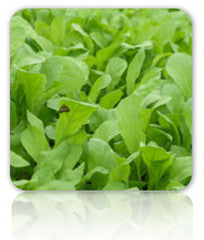
1. Arugula - Classic Roquette (Appx. 150 seeds)
- Arugula can usually be harvested as early as 30-40 days after planting. The leaves of the Arugula plant add a tangy/peppery flavor to any meal. This Arugula variety is an easy-to-grow green. Plant in the spring and again in the fall. Arugula is one of the easiest leafy greens you can grow.
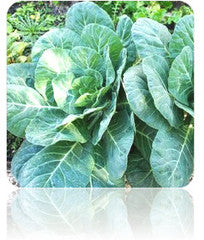
2. Collard - Traditional Georgia Southern (Appx. 50 seeds)
- This is the traditional Collard Green variety popularly grown in the south. Produces large yields of dark blue-green cabbage-like leaves Tolerates heat, humidity, and poor soil conditions.
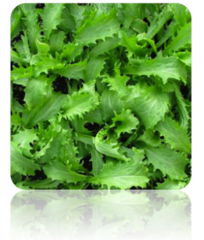
3. Endive - Green Curled (Appx. 100 seeds)
- Endive is a healthy and delicious leafy green. The Green Curled Endive plant produces dark green curly leaves with large tender crisp ribs. Excellent salads and sandwiches. Also good boiled or steamed Extremely easy to grow Endive is rich in many vitamins and minerals, especially in folate and vitamins A and K, and is high in fiber.

4. Kale - Blue Curled Scotch (Appx. 50 seeds)
- The Blue Curled Scotch is an early Kale variety which will produce tasty greens! Excellent in salads or steamed. The blue-green leaves are finely curled and reach up to 12-15" tall! Can handle the cold extremely well. One of the best frost resistant kale varieties available.

5. Kale - Red Russian (Appx. 50 seeds)
- Stems are purple with deep gray-green leaves. The plants mature medium-tall and leaves are tender compared to other kale varieties. Ideal for salads and light cooking. This variety is excellent producer in cooler growing seasons.

6. Lettuce - All Year Round (Appx. 200 seeds)
- As its name suggests, this is a lettuce that can be gown throughout the year. In even some of the the coldest areas across the country, this variety can be grown with some protection with a cloche or cold frame in the cooler months.

7. Lettuce - Gourmet/Mesclun Mix (Appx. 200 seeds)
-
A mixture of favorite lettuce seed varieties from across the spectrum of lettuce types. Plant heavy and start harvest early for young for baby greens then allow some to grow on for plenty of variety for salads. A great way to get a lot out of little space. Perfect for container gardening.

8. Lettuce - Iceberg (Appx. 200 seeds)
- A classic lettuce variety. Iceberg lettuce is most often grown as a leaf vegetable. Mild in flavor, it has been described over the centuries as a cooling counterbalance to other ingredients in a salad. Perfect for burgers and other culinary creations.

9. Lettuce - Classic "Paris Island Cos" (Appx. 135 seeds)
- Large, upright, full-bodied heads with dark-green, slightly savoyed leaves that are mild and sweet. Plant reaches about 10 inches tall. Midribs are crunchy and juicy. Because of their higher chlorophyll content, romaine lettuces are among the most nutritious of all lettuces. Excellent performer in the inter-mountain region. Mosaic tolerant.
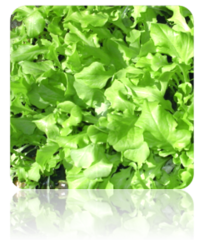
10. Lettuce - Salad Bowl, Green (Appx. 150 seeds)
- The Green Salad Bowl Mix is a really easy-to-grow lettuce variety. Extremely flavorful green leafs. Continues to grow as picked. As outer leaves are picked, inner leaves keep growing. Excellent addition for salads and garnishes

11. Lettuce - Salad Bowl, Red (Appx. 150 seeds)
- The Red Salad Bowl Mix is a really easy-to-grow lettuce variety. Extremely flavorful red leafs. Continues to grow as picked. As outer leaves are picked, inner leaves keep growing. Excellent addition for salads and garnishes.

12. Lettuce - Tom Thumb (Appx. 180 seeds)
- The tom thumb lettuce produces a small, round head with delicate yet delicious leaves. This variety can be planted close together. Ideal for small spaces. Grows well in containers on a patio or windowsill.

13. Mustard - Mizuna (Appx. 50 seeds)
- The Mizuna mustard is a vigorous grower, which produces numerous stalks bearing dark green, deeply cut and fringed leaves. They have a fresh, crisp taste and can be used on their own or cooked with meat. This mustard variety is highly resistant to cold and grows well during the winter months.

14. Mustard - Tendergreen (Appx. 50 seeds)
- A traditional Southern favorite. Plant produces good yields of green mustard leaves. Excellent flavor. Makes a great garnish to any dish. Easy to grow.
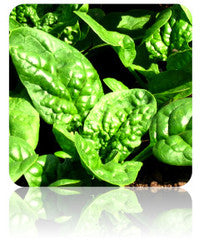
15. Spinach - Bloomsdale (Appx. 70 seeds)
- Bloomsdale Spinach will produce heavy, glossy, dark green leaves. Excellent flavor. Extremely easy to grow. Large, curly dark green leaves. Nice sweet taste.
- From $099 USDUnit price /Unavailable
Description
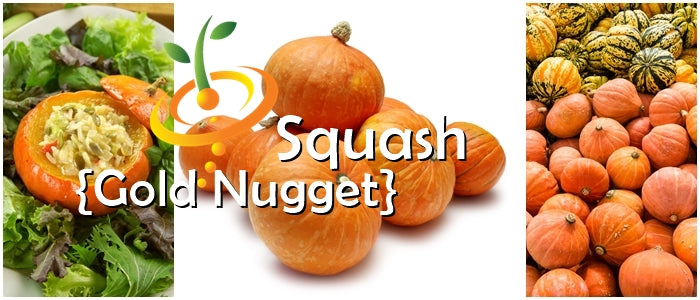
Gold Nugget Winter Squash Seeds
(100% Heirloom/Non-Hybrid/Non-GMO)-
The Gold Nuggest squash is popular 3 lb fruit that is extremely delicious.
- Grows as a compact bush (not as a vine).
- Orange/yellow colored flesh.
- Very sweet and full of flavor - perfect for roasting or baking.
- Ideal for any sized garden and easy to grow.
- Day to Maturity | 80 days
Additional DetailsThough considered a vegetable in cooking, botanically speaking, squash is a fruit (being the receptacle for the plant's seeds). Squash can be served fresh (in salads) and cooked (squash stuffed with meat, fried squash, baked squash).
-
The Gold Nuggest squash is popular 3 lb fruit that is extremely delicious.
Sprouts/Microgreens - Kale, Red Russian
From $499 USDUnit price /UnavailableDescription

Kale Red Russian Micro-Greens
- Really easy to grow.
- Just let them grow until you see the first set of true leaves.
- Perfect for a micro-green salad.
- Makes a great addition to many culinary dishes.
- These sprouts have a mildly sweet flavor.
- Day to Maturity | 3-6 days
- Really easy to grow.
Squash (Winter) - Long Island Cheese
From $325 USDUnit price /UnavailableDescription
 Squash (Winter), Long Island Cheese (100% Heirloom/Non-Hybrid/Non-GMO)
Squash (Winter), Long Island Cheese (100% Heirloom/Non-Hybrid/Non-GMO)-
The Long Island Cheese squash plant produces excellent yields of 10 pound squash resembling a wheel of cheese.
- Grows as a vine (not as a bush)
- Popular heirloom variety passed down for many generations
- The orange flesh is very sweet and can be used for making pie during the autumn months
- Widely grown by people all across New York and New Jersey - Day to Maturity | 100 days
- Best Months to Plant | [March - June] Winter squash love the sun and can't get enough of it. They need about 3 months of warm temperature and one additional month of cooler temps to fully mature.


-
The Long Island Cheese squash plant produces excellent yields of 10 pound squash resembling a wheel of cheese.
Sprouts/Microgreens - Radish, Rambo (Red)
From $499 USDUnit price /UnavailableDescription
-
Organic
-
Spicy
-
Very beautiful red sprouts
- Popular amongst many culinary chefs
-
Tastes like fully grown radish. If you like the taste of radish you'll love Radish Sprouts!
Follow SeedsNow.com's board Radish on Pinterest. -
Sprouts/Microgreens - Beet, Dark Red
From $499 USDUnit price /UnavailableDescription
These Dark Red Beets grow into gorgeous, tender sprouts with deep red shoots and delicate green leaves. An amazing earthy flavor rounds out this extremely rewarding micro-green.
Beets can be the more difficult sprout to grow… but well worth it! It's the prettiest sprout there is (flame red) and can make any plate look and taste even better.
Beets like warm air 75 - 78 degree temperature, humidity 80 - 86%, water temperature 70 degrees) and low light in the room for the first 3 days. The outer surface of a beet seed is like a sponge and can absorb a great amount of water. Please read these instructions carefully:
Proper way to sprout Beet seed:
- Put beet seed in a bucket/tub/container
- Let the seeds soak in warm (not boiling and not cold) water for approx. 8 hours. Stir well in about 4 hours.
- Put in colander and Rinse with lukewarm water until the water that comes off is no longer brown.
⚠️ This is important, as red beet has the above water soluble anti-sprouting components (slime) on its hulls. This is a protection: otherwise, in nature, red beet would sprout in an environment that is not humid enough. Clever seed, isn’t it? - Set aside in a warm room. Give NO WATER and it will sprout in approx. 24-48 hrs.
- Then, water as you would any of your other sprouts & micro-greens
Happy planting!
Sprouts/Microgreens - Chives, Garlic
From $499 USDUnit price /UnavailableDescription
Garlic Chives will produce shoots that grow to a mature height of roughly 12 inches tall. Popularly used to flavor potatoes and salads, Chives are not only tasty, but are also attractive as well. Each plant displays white colored flowers atop slender stems / shoots. Flowering much later than traditional Chives, it’s Garlic twins will bloom within the heat of the summer months. The shoots, once cut will add a slight garlic & onion flavor to any dish that they are added to. The flowers also add a mild onion/garlic flavor and can be used as a garnish.
Very easy to grow.
Country of Origin: Italy
Ready to consume after just a couple of days.
Tomato - Calypso (Indeterminate)
From $299 USDUnit price /UnavailableDescription
The Calypso Tomato is often referred to as a “common salad tomato". Calypso is tolerant of heat and humidity, and great for Southern gardens.
- Common tomato flavor
- Common tomato color
- Heat tolerant
- Great for Southern gardens
SEED PLANTING TIPS
- Botanical name: Solanum lycopersicum
- Growth type: Indeterminate, trellis support, regular pruning
- Tomato size: Medium
- Depth to plant seeds: .25" deep
- Spacing between plants: 24" apart
- Spacing between rows: 36"-48" apart
- Days to germinate (sprout): 7-14 days
- Germination soil temps: 75F-95F
- Soil needs: 6.0-6.5 pH
- Sun needs: Full sun
- Frost hardy: No
- Planting season: Spring, summer
- # of plants per sq. ft.: Appx. 1 plant per 2 sq. ft.
- Days to maturity: 75-80 days
Good companion plants: Basil, Borage, Onion, Parsley, Pepper
Tomato - Big Rainbow (Indeterminate)
From $399 USDUnit price /UnavailableDescription
The Big Rainbow Tomato is a popular ribbed beefsteak variety that produces 1-2 lb fruits. A favorite among gardeners for its marbled palette of orange, red, and yellow skin coloring that continues through to the flesh. Taming all that wildness is a little pot of gold flavor that is well-balanced between acidic and sweet. Heavy producer, so stake well.
- High yields
- Extra large fruit
- Well-balanced flavor
- Hearty slicer
SEED PLANTING TIPS
- Botanical name: Solanum lycopersicum
- Growth type: Indeterminate, trellis support, regular pruning
- Tomato size: Large (1-2 lbs.)
- Depth to plant seeds: .25" deep
- Spacing between plants: 24"-36" apart
- Spacing between rows: 36"-48" apart
- Days to germinate (sprout): 7-14 days
- Germination soil temps: 75F-95F
- Soil needs: 6.0-6.5 pH
- Sun needs: Full sun
- Frost hardy: No
- Planting season: Spring, summer
- # of plants per sq. ft.: Appx. 1 plant per 3 sq. ft.
- Days to maturity: 85-95 days
Click here to view our full Tomato grow guide
Good companion plants: Basil, Borage, Onion, Parsley, Pepper
- From $299 USDUnit price /Unavailable
Description
The Aguadulce Fava Bean is a cold hardy broadbean that can also take a bit of heat. This 4' bush-type plant produces charming white and black flowers that turn into huge green pods with huge, creamy, nutty, protein-rich beans inside. Known as a dried bean, it’s also delicious when eaten fresh from the pod. With its edible leaves, high yields, and nitrogen-fixing properties, this is a gorgeous performer for fall and winter gardens in all grow zones.
- Easy to grow
- Cold hardy to 20 degrees F
- Nitrogen fixer
- Great for winter gardens
SEED PLANTING TIPS
- Botanical name: Vicia faba
- Depth to plant seeds: 2" deep
- Spacing between plants: 4"-6" apart
- Spacing between rows: 18"-24" apart
- Days to germinate (sprout): 10-14 days
- Germination soil temps: 50F-65F
- Soil needs: 6.0-7.0 pH
- Sun needs: Full sun
- Frost hardy: Yes
- Planting season: Spring, fall, winter
- # of plants per sq. ft.: Appx. 2-4 plants per sq. ft.
- Days to maturity: 75-80 days when spring sown, 180 days when fall sown
Click here to view our full Bean grow guide
Good companion plants: Cabbage, Carrot, Lettuce, Parsley, Rosemary
Nasturtium - Tall Trailing Mix Flowers
From $399 USDUnit price /UnavailableDescription
This fast-growing, vine-like or "trailing" plant can easily reach 10 feet in length by the end of the growing season! Perfect for growing along fences, or above retaining walls. It boasts colorful flowers in many shades of yellow, orange and even occasionally red.
- Nasturtium flowers are one of the most popular edible flowers grown in home gardens. The petals have a slight peppery taste, and the seeds and leaves are also edible! You can even use the seeds as an alternative to capers.
- Not only are the flowers pretty, Nasturtiums are great companion plants! They are also known to deter aphids, whiteflies, cucumber beetles & more. Learn more >
- Nasturtiums should be planted in the spring for a "summer show". Plant in full sun, and in sandy, well drained soil. Generally, the poorer the soil quality, the more flowers the plant will produce! Deadhead your plants regularly to encourage new blooms, all season long. These flowers will self-seed resulting in more flowers for years to come!
- These are PERFECT for beginner gardeners! These annuals are very easy to grow from seed and can be grown just about anywhere, even places that are susceptible to drought.
- The bright flower petals will liven up any garden, with very little effort! They are also GREAT for planting in hanging baskets or containers.
Squash (Summer) - Marrow, White
From $399 USDUnit price /UnavailableDescription

-
The White Marrow Summer Squash produces some of the most beautiful looking snow white squash
- Grows as a compact vine (not as a bush)
- Best when picked at 8" long
- Perfect for small gardens, containers, and raised beds
-
Days to Maturity | 85 days
- Best Months to Plant | [March - June] Summer squash love the sun and can't get enough of it. They are warm-season crops and are sensitive to cold/frost. Plant your seeds as soon as the soil has warmed.
Additional DetailsThough considered a vegetable in cooking, botanically speaking, squash is a fruit (being the receptacle for the plant's seeds). Squash can be served fresh (in salads) and cooked (squash stuffed with meat, fried squash, baked squash).
-
The White Marrow Summer Squash produces some of the most beautiful looking snow white squash
Squash (Winter) - Burgess Buttercup
From $399 USDUnit price /UnavailableDescription
Squash (Winter), Burgess Buttercup
- Cucurbita maxima.
- Plant produces heavy yields of 8" long turban shaped green squash with silvery white stripes.
- The yellow orange flesh is very sweet and grows 3 to 5 lbs.
- The Burgess strain stores well.
-
A winter squash variety.
-
Day to Maturity | 90 days
- Cucurbita maxima.
- From $299 USDUnit price /Unavailable
Description

- The White Detroit beets has great flavorful. Perfect for gourmet dishes
- Very popular
- Easy to grow
- Days to Maturity | 55-60 days
Shop all Beet Seeds 📚 Beets Grow Guide - The White Detroit beets has great flavorful. Perfect for gourmet dishes
Sprouts/Microgreens - Fenugreek
From $999 USDUnit price /UnavailableDescription
- From $299 USDUnit price /Unavailable
Description
The Pumpkin Wee Bee Little variety is a compact and productive cultivar that has gained popularity among gardeners for its unique characteristics and suitability for small spaces. This variety is particularly well-suited for urban gardening, container gardening, and small garden plots, making it an excellent choice for both novice and experienced gardeners.
One of the most notable features of the Pumpkin Wee Bee Little is its size. Typically, the fruits reach a diameter of about 3 to 4 inches, making them ideal for decorative purposes, culinary use, or as part of a harvest display. The plants themselves are bushy and compact, usually growing to a height of 12 to 18 inches, which allows for efficient space utilization in the garden.
- Mini pumpkins about the size of a grapefruit
- Weigh about 14 ounces each pumpkin
- Days to Maturity | 90 days
Additional DetailsThe word pumpkin originates from the word pepon, which is Greek for “large melon". The French adapted this word to pompon, which the British changed to pumpion and later American colonists changed that to the word we use today, "pumpkin".
- Mini pumpkins about the size of a grapefruit
- From $399 USDUnit price /Unavailable
Description

- Beautiful tight green crinkled lettuce leaves
- Curly leaves with really nice texture and color
- Extremely popular amongst gourmet chefs and restaurants
- Easy to grow and does not require a lot of space
-
Days to Maturity | 50 days
-
Lettuce Seeds | Lettuce can be grown practically anywhere. For leaf types seed should be sown thinly in rows 1 foot apart. For head, Bibb, and cos types, space rows 18 inches apart.
Click here for complete Lettuce grow guide
- Beautiful tight green crinkled lettuce leaves
Onion (Sets) - Wethersfield, Red
From $299 USDUnit price /UnavailableDescription

Quick Overview
Large globe with very thin, reddish-purple colored skin.
The white flesh is very firm and tinged with pink or purple highlights.
Fine strong flavor, vigorous.They are technically long day onions. However, they can be grown anywhere, down south they will be more grown like big scallions.
How to Plant Bulb Onions
Onion bulbs are quite hardy and can withstand 20° F frost. They should be set out 4-6 weeks prior to the last expected frost. When your plants arrive they should appear to be quite dry. DO NOT WET THEM NOR STICK THEIR ROOTS IN WATER. Unpack them and store them in a cool, dry place until it is time to plant. They should last about 3 weeks kept this way. Do not worry that your plants seem dry. They will "shoot" new roots and new, green tops as soon as they are planted.Shallot (sets) - Holland, Red (Organic)
From $399 USDUnit price /UnavailableDescription
Each shallot can typically yield about 5-10 shallots per harvest. Best time to plant is usually in the Fall (Sept. - Nov.)

Quick Overview:- Copper Red
- Easy to grow
- Rare heirloom variety - hard to find
- Stores very well
- Excellent flavor
More Details:
A coppery red outer skin peels easily to reveal a reddish-purple flesh. Excellent flavor, great in sauces. This one can produce tenfold!! Contains potassium and vitamins A, B-6 and CHow to Plant:
Plant the pointy side of the shallot facing up with no more than 1/4" of soil covering the shallot. Make sure your have 7-8 inches of soil to allow the roots to grow freely. Space each bulb 10" - 12" apart from each other.
Note: Each shallot can typically yield about 5-10 shallots per harvest. Best time to plant is usually in the Fall (Sept. - Nov.)Wildflowers - Cosmos Flower Scatter Garden Seed Mix
From $499 USDUnit price /UnavailableDescription
Includes a mix of 7 popular cosmos flower varieties. Scatter this mix in your garden and enjoy a beautiful assortment of cosmos flowers!
Wildflower establishment requires some important steps:
- Site selection/preparation: It's important to address competition from weeds: pull, till, or use organic herbicides. If planting in the spring/summer you can wait for weeds to germinate, control and then plant the wildflower seeds.
- Seeding: You will want to have good seed to soil contact, broadcasting by hand is a good approach on small plot, may want to mix with an inert carrier, sand or other. Raking in and covering with soil 2-3 times seed thickness.
- Watering: During establishment for the first month, can be from rain in spring or supplement with irrigation.
- Timing: The best time to plant is in spring to early summer and even again in late fall.
This mix includes all of the following seed varieties:GENUS/SPECIES
COMMON NAME
Cosmos bippinatus
Cosmos, Sensation Mix
Cosmos bippinatus
Dazzler
Cosmos bippinatus
Gloria
Cosmos bippinatus
Picotee
Cosmos bippinatus
Pinkie
Cosmos bippinatus
Purity
Cosmos sulphureus
Sulphur Cosmos
continue shopping
Featured Seed Types (A - Z)
view all

































































 Includes a mixture of 6 popular coneflower varieties. Scatter this mix in your garden and enjoy a beautiful assortment of coneflowers!
Includes a mixture of 6 popular coneflower varieties. Scatter this mix in your garden and enjoy a beautiful assortment of coneflowers!






































































































































